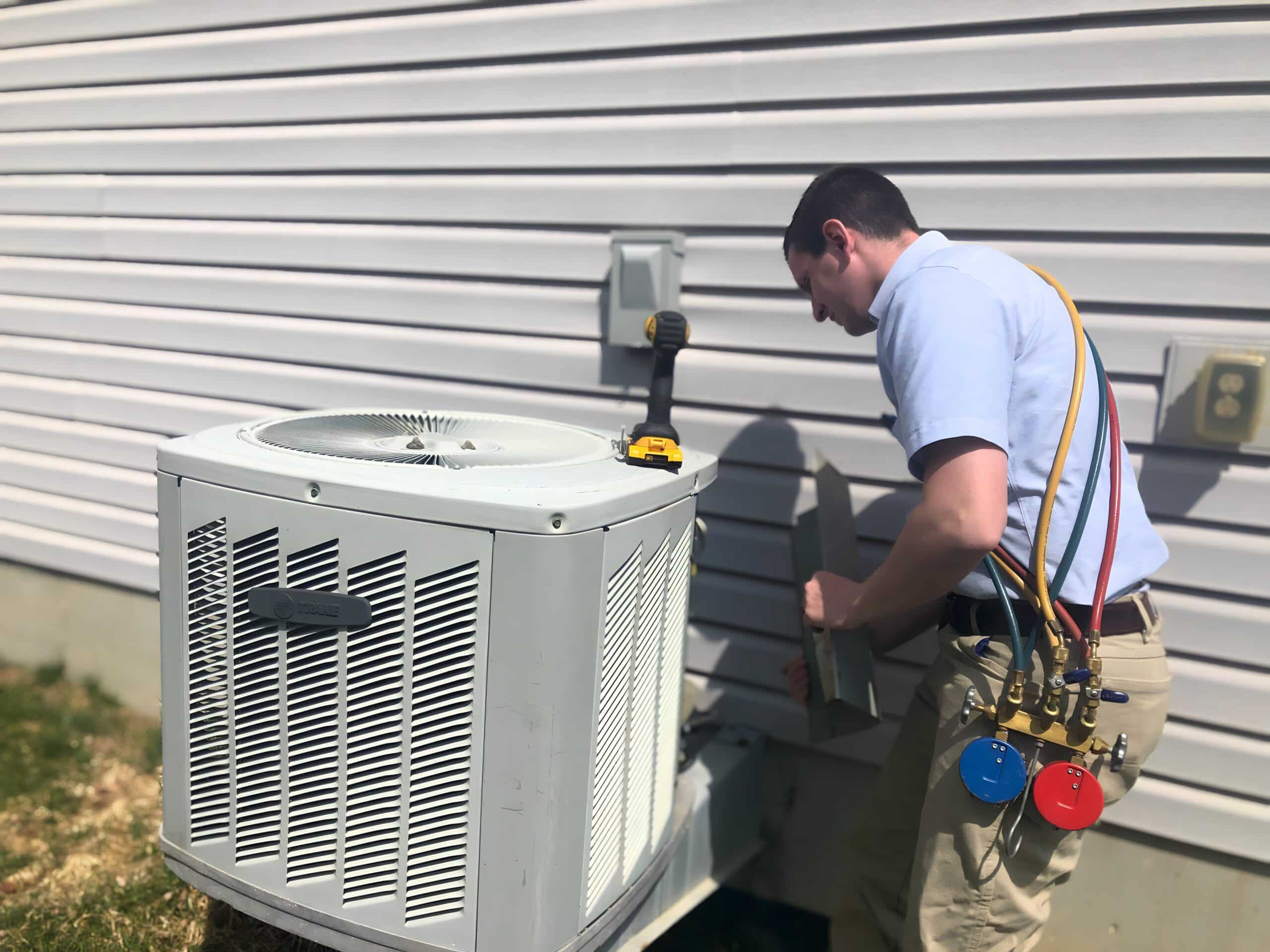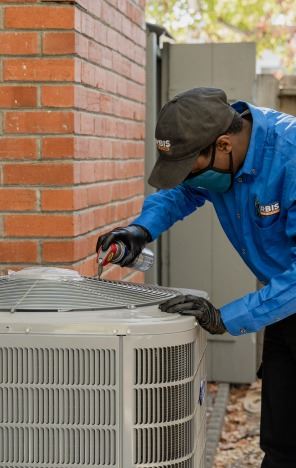Warning Signs It's Time for a furnace replacement
Wiki Article
Choosing In Between a Warmth Pump and Heating System: Trick Factors To Consider for Your Cooling And Heating Demands
When examining heating choices for heating and cooling requires, the choice between a heatpump and a heater can be complicated. Each system provides unique advantages customized to certain environments and energy performance objectives. Understanding these differences is necessary for making an informed option. Key elements such as setup costs and ecological effect additionally complicate the choice procedure. Which alternative genuinely aligns with one's convenience and sustainability preferences? The following areas will certainly explore these factors to consider in detail.Understanding Warmth Pumps: Exactly How They Function and Their Advantages
While numerous homeowners take into consideration different heating choices, recognizing exactly how heat pumps feature and their benefits can substantially influence their choice. Heatpump run by transferring warmth instead of generating it. In the winter, they extract heat from the outside air or ground and transfer it inside your home, while in the summertime, they reverse this process, cooling the home by expelling warm outside. This dual functionality makes them flexible for year-round environment control.One of the primary benefits of warmth pumps is their energy effectiveness. They make use of substantially less electrical energy contrasted to typical heater, possibly causing reduced utility bills (heat pump installation ooltewah tn). In addition, heatpump have a smaller carbon footprint, making them an environmentally friendly choice. They also require less maintenance than conventional systems, adding to long-term price financial savings. Generally, understanding the technicians and benefits of heatpump can aid home owners make educated choices regarding their home heating and cooling needsChecking Out Heating Systems: Types, Operation, and Advantages
Heating systems are available in different types, including gas, electric, and oil models, each with distinct functional devices. Recognizing these distinctions is crucial, as they influence performance and home heating performance. Furthermore, heating systems provide numerous benefits, such as regular warmth outcome and dependability in colder climates.Kinds of Heaters
Heating unit can differ considerably in layout and operation, with furnaces being a popular option among homeowners. There are numerous kinds of heating systems, each utilizing various fuel sources and modern technologies. Gas furnaces prevail, leveraging gas to create heat efficiently. Electric heating systems, on the other hand, make use of electric resistance to generate warmth, frequently preferred for their simple installation. Oil furnaces, while much less usual, are reliable in locations with restricted gas gain access to (heat pump installation ooltewah tn). Additionally, condensing heating systems take full advantage of energy effectiveness by recording and recycling exhaust gases. Each type runs with a system of warm exchangers and ductwork to disperse cozy air throughout a home. Understanding the distinctions in between these heater types is important for notified cooling and heating decisionsBenefits of Furnaces
For property owners looking for trusted warmth during chilly months, the advantages of heaters are significant. Heating systems offer regular home heating, ensuring also temperature levels throughout the home. They are particularly effective in severe cold, commonly surpassing heat pumps in cold problems. Various types, including gas, electrical, and oil heating systems, supply versatility to fulfill diverse needs and preferences.Furnaces also tend to have reduced initial setup costs compared to heat pumps, making them a more easily accessible choice for many. Their robust design contributes to a longer life-span, with several systems lasting over 15 years with appropriate maintenance. Additionally, contemporary heating systems are often equipped with sophisticated innovation for enhanced efficiency, which can cause decreased power bills. In general, heating systems stay a trustworthy choice for effective home heating.
Energy Efficiency: Comparing Heat Pumps and Furnaces
When comparing energy efficiency in between heatpump and heaters, the Seasonal Power Efficiency Ratio (SEER) plays an important function in determining performance. Furthermore, an operational price evaluation reveals the lasting financial ramifications of each system. Understanding these aspects can guide house owners in making informed decisions regarding their home heating remedies.Seasonal Energy Effectiveness Proportion
Power efficiency plays an essential role in the decision-making process between heatpump and heaters, particularly when taking into consideration the Seasonal Energy Effectiveness Ratio (SEER) This metric measures the cooling effectiveness of heatpump over an entire cooling season, providing a standardized means to evaluate efficiency. Greater SEER scores suggest higher power effectiveness, equating to lower energy consumption and lowered energy expenses. On the other hand, furnaces are normally examined utilizing the Yearly Gas Use Performance (AFUE) ranking, which mirrors heating effectiveness. When contrasting these 2 systems, home owners need to prioritize SEER ratings for heatpump, as they straight effect general energy financial savings and ecological sustainability. A detailed understanding of SEER can significantly influence the long-lasting satisfaction and cost-effectiveness of the picked HVAC remedy.Functional Expense Analysis
Comprehending the operational expenses connected with heatpump and furnaces is essential for home owners assessing their options. Warmth pumps generally provide higher energy performance, converting electrical power into heat with marginal waste. This causes reduced monthly energy bills, specifically in modest climates. Conversely, traditional heating systems, specifically gas designs, might have reduced ahead of time prices however can incur greater operational costs in time due to fuel costs and efficiency ratings.Moreover, warmth pumps can function as both heating and cooling down systems, possibly reducing the requirement for different cooling and heating units. While first financial investments for heat pumps might be greater, their long-lasting savings in energy performance can make them an extra cost-efficient option for many homes. Mindful analysis of regional power rates is crucial to identify the most effective alternative.Installation Expenses: What to Expect for Each Furnace
Installment prices for furnace can vary significantly between heatpump and furnaces, influencing house owners' choices. Warmth pumps usually have greater in advance installation expenses, typically varying from $3,500 to $8,000, depending upon the unit dimension and intricacy of installation. This includes the outside system, indoor handling system, and needed ductwork alterations. Alternatively, heaters tend to have lower first prices, averaging between $2,500 and $6,000, which can be appealing for budget-conscious homeowners. Installment expenditures can increase if considerable ductwork is required.Moreover, the option of gas type for furnaces-- all-natural gas, gas, or electrical-- can additionally affect setup costs. While heat pumps supply energy efficiency, their initial financial investment may discourage some purchasers. Eventually, evaluating installment expenses together with long-term cost savings and effectiveness will aid house owners in making notified choices regarding their heating unit.Environment Considerations: Which System Performs Much Better in Your Area
Just how do environment conditions affect the efficiency of heating unit? The efficiency of heatpump and heating systems can differ significantly relying on the local environment. In moderate climates, heatpump succeed by efficiently moving heat from the outdoors air, making them an energy-saving alternative. Their performance decreases in incredibly cool temperatures, where they may have a hard time to extract adequate warm. Conversely, heaters, particularly gas designs, give reputable and regular heat no matter of exterior conditions, making them more suitable in chillier regions.In locations that experience milder winters months, heatpump can run effectively year-round, offering both cooling and heating. On the other hand, areas with rough winters typically take advantage of the effectiveness of heaters. Inevitably, understanding the neighborhood environment is necessary when determining in between a warmth pump and a furnace, as it directly affects their operational effectiveness and general performance.Upkeep Needs: Long-Term Look After Warm Pumps vs. Furnaces
While both warm pumps and furnaces call for regular maintenance to assure peak performance, their specific needs and care routines More Help vary considerably. Furnaces typically require less constant interest, with annual examinations sufficing to look for gas leakages, clean filters, and evaluate overall capability. Their easier design commonly enables straightforward repairs.In comparison, heatpump demand biannual upkeep because of their dual duty in cooling and heating. This includes cleaning coils, inspecting cooling agent levels, and ensuring that both the indoor and outside units work at their finest. Additionally, warmth pump maintenance usually includes even more intricate elements, making professional servicing essential.Neglecting upkeep can lead to lessened effectiveness and raised energy costs for both systems. Ultimately, homeowners should take into consideration these lasting treatment needs when picking in between a heatpump and a furnace, as proactive maintenance can prolong the life-span and efficiency of either system substantially.Environmental Effect: Selecting a Lasting Heating Alternative
The ecological impact of heating unit is a critical evaluation for house owners looking for sustainable choices. Heatpump are usually a lot more energy-efficient than typical furnaces, as they move warmth instead than produce it, significantly minimizing carbon discharges. By making use of renewable resource resources, such as air-source or geothermal heatpump, home owners can better lessen their ecological footprint.On the various other hand, natural gas heating systems send out greenhouse gases and add to air contamination, though they link typically supply greater heat output. Advancements in modern technology have actually led to the advancement of high-efficiency furnaces that reduce emissions.Ultimately, selecting a heating system includes evaluating effectiveness versus ecological effect. Homeowners are encouraged to review regional power sources and motivations for sustainable systems, ensuring a choice that lines up with both personal convenience and ecological obligation. The decision influences not only prompt comfort but also lasting sustainability and environmental health.Often Asked Inquiries
Just How Long Do Warmth Pumps and Furnaces Commonly Last?
The lifespan of heat pumps generally varies from 15 to 20 years, while heating systems can last in between 15 to 30 years. Regular upkeep substantially affects their longevity and effectiveness in offering heating options.Can I Use a Heatpump in Very Cold Climates?
Heatpump can operate in very cold climates, however their performance lessens as temperature levels decrease. In such problems, supplemental home heating resources might be necessary to keep comfy interior temperatures and ensure peak efficiency.
What Is the Sound Level of Heat Pumps Versus Furnaces?
The sound levels of heat pumps and heating systems vary considerably. Typically, heat pumps operate even more quietly than traditional furnaces, making them preferable for those conscious sound, while furnaces may produce louder functional sounds throughout home heating cycles.
Are Warmth Pumps Suitable for Both Heating & Cooling?
Heatpump are indeed appropriate for both heating and cooling (furnace replacement). They operate by transferring warmth, giving effective temperature level control year-round, making them a flexible selection for homeowners looking for an all-in-one HVAC serviceWhat Dimension Heating Unit Do I Required for My Home?
Determining the ideal dimension heater for a home needs assessing variables discover this info here such as square video, insulation quality, local climate, and the home's layout. Consulting a specialist can assure an exact assessment and ideal convenience. Warmth pumps commonly use greater energy performance, converting electric energy right into heat with marginal waste. In modest environments, heat pumps excel by successfully transferring warm from the outdoors air, making them an energy-saving alternative. On the other hand, furnaces, specifically gas models, give consistent and trusted warmth regardless of outside conditions, making them more effective in colder regions.In areas that experience milder wintertimes, heat pumps can operate properly year-round, giving both heating and cooling. Warmth pumps are usually a lot more energy-efficient than typical heating systems, as they transfer heat instead than create it, considerably minimizing carbon discharges. By using renewable power sources, such as geothermal or air-source warmth pumps, home owners can additionally minimize their eco-friendly footprint.On the various other hand, all-natural gas furnaces release greenhouse gases and contribute to air pollution, though they typically provide greater warmth result.Report this wiki page